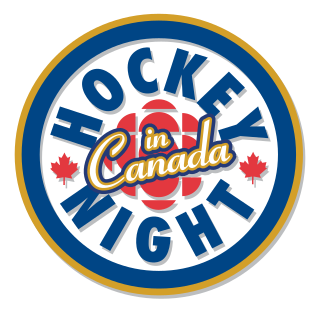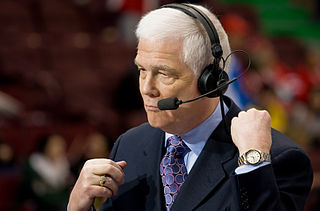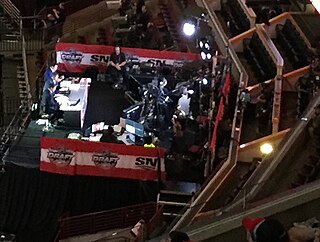Related Research Articles

CBC Television has aired National Hockey League (NHL) broadcasts under the Hockey Night in Canada brand that is primarily associated with its Saturday night NHL broadcasts throughout its history in various platforms.
The Sports Network (TSN) is a Canadian English language discretionary sports specialty channel owned by CTV Specialty Television, owned jointly by Bell Media (70%) and ESPN Inc. (30%). The company was established by the Labatt Brewing Company in 1984 as part of the first group of Canadian specialty cable channels. TSN is the largest specialty channel in Canada in terms of gross revenue, with a total of CA$400.4 million in revenue in 2013.

Robert Cecil Cole is a Canadian former sports television announcer who has worked for CBC and Sportsnet and former competitive curler. He is known primarily for his work on Hockey Night in Canada.

Ronald Joseph Corbett MacLean is a Canadian sportscaster for the CBC and Rogers Media, best known as the host of Hockey Night in Canada from 1986 to 2014 and again since 2016, and is also a hockey referee.

Dave Hodge is a Canadian sports announcer. Hodge worked for TSN, the CBC and CFRB 1010 radio in Toronto.

TSN Hockey is the blanket title used by TSN's broadcasts of the National Hockey League.
"The Hockey Theme" is a Canadian piece of instrumental theme music composed in 1968 by Dolores Claman and orchestrated by Jerry Toth. It was widely recognized as Canada's unofficial second national anthem.
NHL on CTV is the name of a former television program that broadcast National Hockey League games on the CTV Television Network.
Paul Romanuk is a Toronto sportscaster and writer. He was born in Oshawa, Ontario, Canada.
NHL on Global was the de facto name of a television program that broadcast National Hockey League games on the Global Television Network. The program aired during the 1987 and 1988 Stanley Cup playoffs under the titles Stanley Cup '87 and Stanley Cup '88 respectively.

NHL on Sportsnet is the blanket title for presentations of the National Hockey League broadcast held by a Canadian media corporation, Rogers Communications, showing on its television channel Sportsnet and other networks owned by or affiliated with its Rogers Media division, as well as the Sportsnet Radio chain. Sportsnet previously held the national cable rights for NHL regular season and playoff games from 1998 to 2002. In November 2013, Rogers reached a 12-year deal to become the exclusive national television and digital rightsholder for the NHL in Canada, beating out both CBC Sports and TSN.
Coach's Corner is a commentary and analysis segment that aired from 1982 to 2019 during the first intermission of the Hockey Night in Canada (HNIC) television broadcast of National Hockey League (NHL) games. It featured Don Cherry, and was co-hosted by Dave Hodge from 1982 until 1986, and by Ron MacLean from 1986 to 2019.
During the 1979–80 and 1980–81 seasons, four more Canadian teams, the Edmonton Oilers, Quebec Nordiques, Winnipeg Jets, and Calgary Flames, joined the NHL. The Oilers and Flames were featured frequently as the two teams were contenders the 1980s; in contrast, as the Nordiques were owned by Carling-O'Keefe, a rival to the show's sponsor Molson and whose English-speaking fanbase was very small, the Nords were rarely broadcast, and never from Quebec City during the regular-season.
After Wayne Gretzky was traded to the Los Angeles Kings in 1988, CBC began showing occasional double-headers when Canadian teams visited Los Angeles to showcase the sport's most popular player. These games were often joined in progress, as the regular start time for Hockey Night in Canada was still 8 p.m. Eastern Time and the Kings home games began at 7:30 p.m. Pacific Time. Beginning in the 1995 season, weekly double-headers became permanent, with games starting at 7:30 Eastern and 7:30 Pacific, respectively. In 1998, the start times were moved ahead to 7 p.m. ET and PT.
Since 2000, the CBC has aired an annual special Hockey Day in Canada broadcast to celebrate the game in Canada. The broadcast includes hockey-related features all afternoon, leading up to a tripleheader of NHL action featuring the seven Canadian teams. One exception was the 2008 edition that featured four games including two American teams along with the six Canadian teams; this was due to the NHL's schedule format at the time, as there was no inter-conference games between Canadian teams. Lead commentators, Don Cherry and Ron MacLean broadcast from a remote area. The broadcast includes live broadcast segments from smaller communities right across the country and features panel discussions on issues facing "Canada's game" at both the minor and pro levels. The day is usually in mid-February, but was broadcast in early January in 2002 and 2006 due to the 2002 Winter Olympics and 2006 Winter Olympics, respectively; the 2007 event was also held in January, though no sporting events key to Canada were scheduled.

On April 19, 2011, after ESPN, Turner Sports, and Fox Sports placed bids, NBC Sports announced it had reached a ten-year extension to its U.S. television contract with the NHL worth nearly $2 billion over the tenure of the contract. The contract would cover games on both NBC and sister cable channel Versus, which became part of the NBC Sports family as the result of Versus parent Comcast's controlling purchase of NBC Universal earlier in 2011.
References
- ↑ "MacPherson back at CBC". Marketing. January 1984.
- ↑ "Mr. Fixit". History of Canadian Broadcasting. Canadian Communications Foundation. Retrieved 26 October 2021.
- ↑ "In View". History of Canadian Broadcasting. Canadian Communications Foundation. Retrieved 26 October 2021.
- ↑ "Observer, The". History of Canadian Broadcasting. Canadian Communications Foundation. Retrieved 26 October 2021.
- ↑ "CTV Television Network". History of Canadian Broadcasting. Canadian Communications Foundation. Retrieved 26 October 2021.
- ↑ "Herrndorf named to head English CBC". The Globe and Mail. September 20, 1979.
- 1 2 3 "Head of First Choice gets CBC sports job". The Globe and Mail. January 17, 1984.
- ↑ Giniger, Henry (March 29, 1982). "Canada Begins Licensing Pay-TV Networks". The New York Times.
- ↑ "Proper channels". The Globe and Mail. January 20, 1983.
- ↑ Johnson, Bryan (January 7, 1984). "Pay-TV Fights to Stay Afloat in Sea of Red Ink". The Globe and Mail.
- ↑ "Esaw bitter as CBC outbids CTV for contract". The Citizen. March 22, 1986.
- ↑ McKee, Ken (March 3, 1987). "5.5 million tuned in for Rendez-Vous 87". The Toronto Star.
- ↑ Jennings, Cec (April 19, 1986). "CBC's TV sports coverage survives the cuts". The Globe and Mail.
- ↑ McKee, Ken (March 27, 1987). "Women's curling final loses to CBC's financial problems". The Toronto Star.
- ↑ McKee, Ken (January 3, 1988). "No TV, radio for junior tilts". The Toronto Star.
- 1 2 Strachan, Al (March 30, 1987). "Hodge puts his foot in his mouth". The Globe and Mail.
- ↑ Dave Hodge Tells CBC How It's Done, Sports History Channel on YouTube. Retrieved on 23 November 2019.
- ↑ "Hodge, CBC differ over firing claim". The Vancouver Sun. April 1, 1987.
- ↑ Zwolinski, Mark; McKee, Ken (April 4, 1987). "Dave Hodge set to strike deal with Global team". The Vancouver Sun.
- ↑ Campbell, Neil (April 1, 1987). "Canadian tradition continues; CBC keeps Saturday hockey". The Globe and Mail.
- ↑ "Smith appointed new chief of CBC Television Sports". The Globe and Mail. July 23, 1988.
- ↑ "Don (Former Broadcast Executive) MacPHERSON". The Globe and Mail. March 6, 1998. Retrieved October 26, 2021.